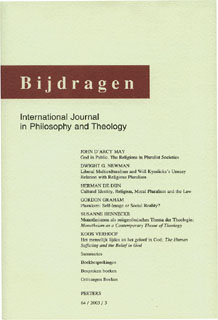 previous article in this issue previous article in this issue | next article in this issue  |

|
Document Details : Title: Niets wankelt waar geloof ontbreekt Subtitle: Jean-Luc Nancy's proeve van een deconstructie van het christendom Author(s): DEVISCH, Ignaas Journal: Bijdragen Volume: 63 Issue: 3 Date: 2002 Pages: 311-334 DOI: 10.2143/BIJ.63.3.813 Abstract : In his short text ‘La déconstruction du christianisme’ from 1998, the French philosopher Jean-Luc Nancy set up the preliminaries for his ‘deconstruction of Christianity’. This differs from a plea or a criticism of Christianity. It is the question if atheism is the very antipode of religion or if religion has a sort of auto-critical gesture towards itself. We love to say that we are – we moderns – no longer Christians, but maybe the Christian aspects of our existence are so evident, that we are no longer conscious of them. It is his thesis that Christian thinking or onto-theology in a more general way – thinking of the world out of a first Cause, a Supreme God, etc – lies itself at the basis of a thinking of the world and nothing but the world. Ontotheology, so is Nancy’s thesis, dismantled or autodeconstructed itself and became more and more, a thinking of the immanent world. In this respect, he seems to affirm the classic thesis of secularisation: in a society based on religion, the sense of the world is situated above the world, or has an over-worldwide status. In a secular society, sense would finally be immanent in the world. The truth is that he questions nothing but this thought. Take for example the question whether our existence has a meaning. The thought that it really has and that it is attached to existence by some self constitutive instance – whether it is a God or a subject – is present as well in Christianity as in atheism. Nancy tries to think the sense of the world out of the transcendental conditions of our existence. An atheist world is a world in which sense is no longer attached to the world, but where it is the condition of our Being-in-the-world as such. The world does not have sense, it is sense, and this naked existence means that we have to exist in the sense that we are. We are exposed to the world and to ourselves, and that is the sense of existence, of our being-together-in-the world. |
